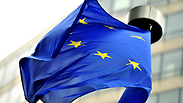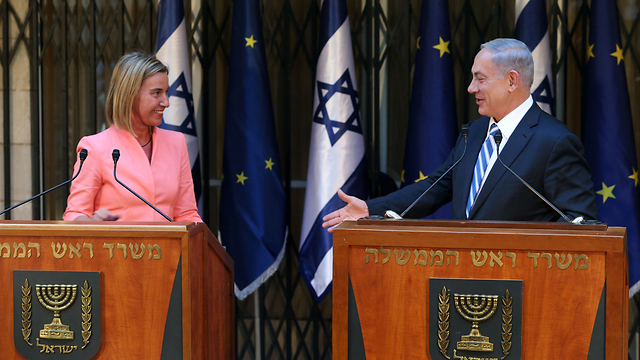
Israelis, don't give up on Europe
Op-ed: Going to the generally sympathetic US and making new friends, like China and India, who don’t ask awkward questions, is always easier. But Israel has many friends in the EU who seek a deeper engagement.
.
That’s what the EU-Israel relationship feels like just now.
The last Israeli Prime Minister to visit the capital of the EU institutions was Yitzak Rabin. That was 20 years ago. By any definition, that’s one hell of a gap between visits.
And the EU isn’t best pleased.
I’m in Israel often, and on flights there I’m invariably seated beside someone who over the meal or drink inquires as to my visit. I tell them I am a director of a public affairs and press organization that seeks to bring the EU and Israel closer together.

The answer is 99.9 percent the same or a variation of this: “Good job, but you are wasting your time, Europe doesn’t understand us and we have given up on it, but hey, thanks for trying.”
Whether we like it or not, the EU’s influence on world affairs is growing. The heads of the EU institutions have simply invested too much in the EU’s foreign policy arm – the European External Action Service (EEAS) – and in the appointment of a dedicated high represenative, Federica Mogherini, not to mention opening EEAS offices around the globe. All this prevented them from making a more meaningful impact at negotiating tables in areas of conflict.
And in the European Parliament, pro-European parties who make up a majority of MEPs are 100 percent behind the EEAS. Like some banks during the financial crisis, it is too big to fail.
Let us be honest: The EEAS cannot really bask in glory when it comes to the Middle East. Its influence in Egypt, Syria, Libya and Iran has been benign at best, or a downright failure at worst.
The service and the many parliamentarians who support it need to cling to a victory – and to this end they've been eyeing the Israel-Palestinian conflict. And they will use any means at their disposal to get Israel’s attention.
We anticipate a European Parliament statement on the Middle East peace process very shortly. The texts are being drafted as I write and my organization and others in Brussels are meeting MEPs to see what we can do to alleviate the situation and get a decent result.
In the absence of a proper high-level dialogue between Israel and the EU, we will most likely see a harsh and uncompromising resolution that will call for an end to settlement construction.
The next steps will be a gradual introduction of sanctions, most prominent of which will be the labelling of settlement products.
All of this is borne out of frustration. Frustration at being ignored and frustration that the Prime Minister would rather spend time his time in Milan, London, Paris or Berlin without even contemplating a courtesy call to Brussels.
This brings me back to friendship. Of course I get where Prime Minister Netanyahu is coming from. Going to the US Congress, where he is guaranteed a warm welcome, is always easier; and so is making new friends, like China and India, who don’t ask awkward questions.
But Israel has many, many friends in the EU. We meet with them every day.
They care passionately about the country and only want the best for its people. We meet parliamentarians, senior staffers and civil servants who all want to help. With no exceptions, they are all fed up with hearing a lopsided narrative, and eagerly want to make a difference. Above all they just want to understand, to be briefed and feel that their efforts are reciprocated.
That is why it’s a diplomatic and strategic mistake to try and bypass the EU.
It takes two to tango, and right now the EU feels like a scorned lady on the diplomatic dance floor.
As we approach the New Year, we look at our relationships and friendships and we seek to make amends.
It’s time the Prime Minister had a proper look at his with the EU.
Alex Benjamin is the Director of EIPA. Europe Israel Public Affairs/Press Association, a multi-disciplined pro-Israel advocacy organization headquartered in Brussels, with offices in Paris and Berlin. www.eipa.eu.com










